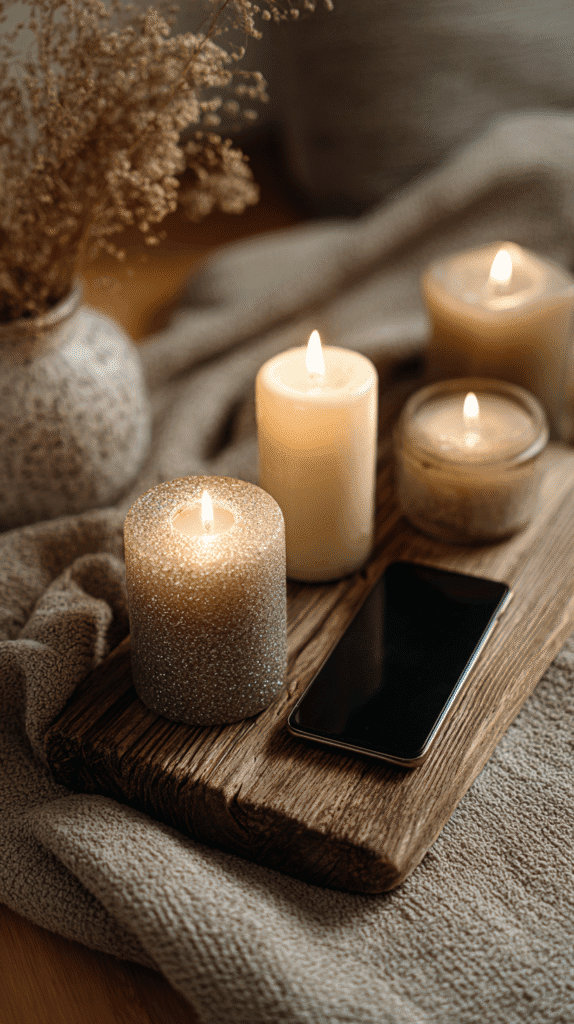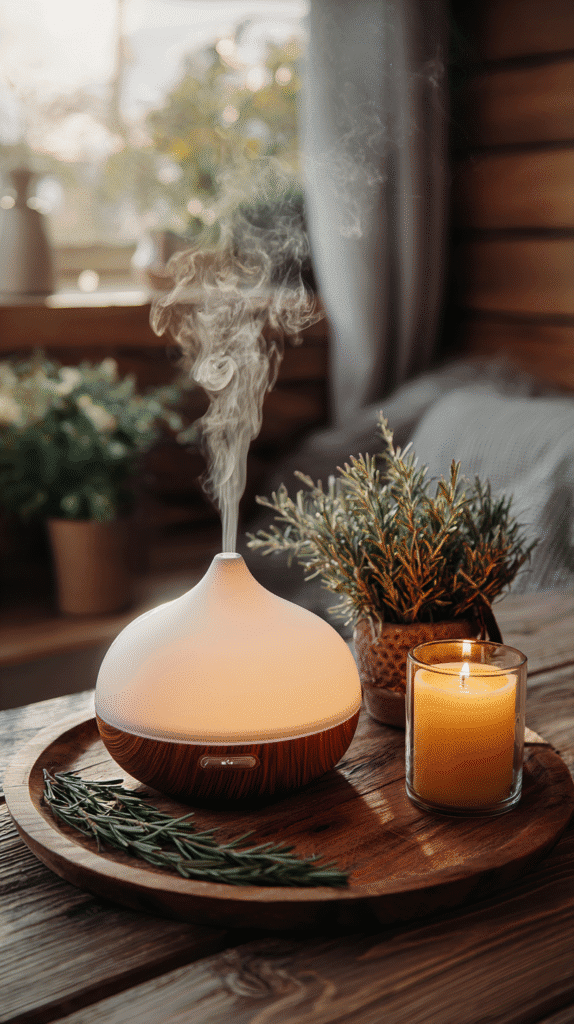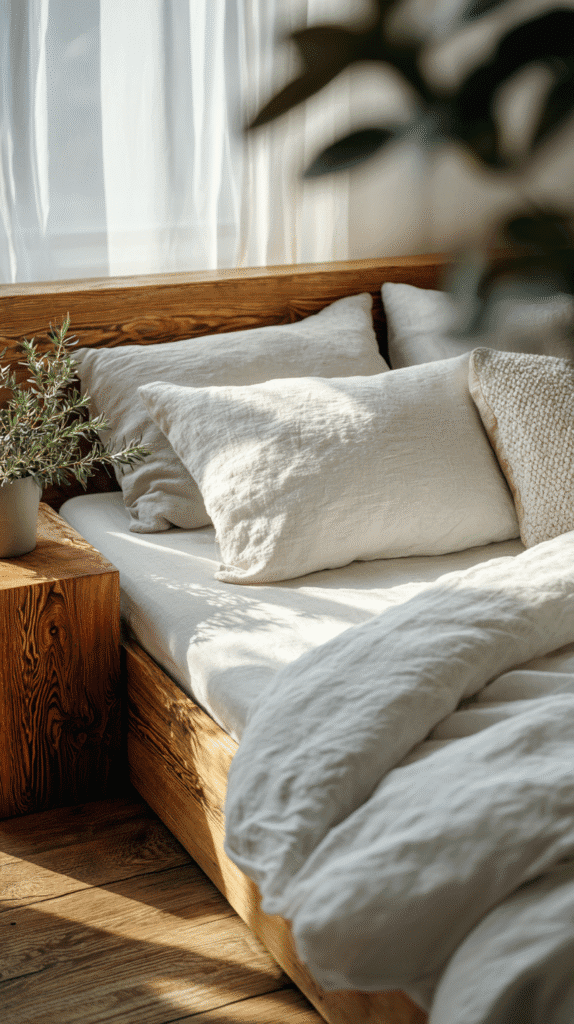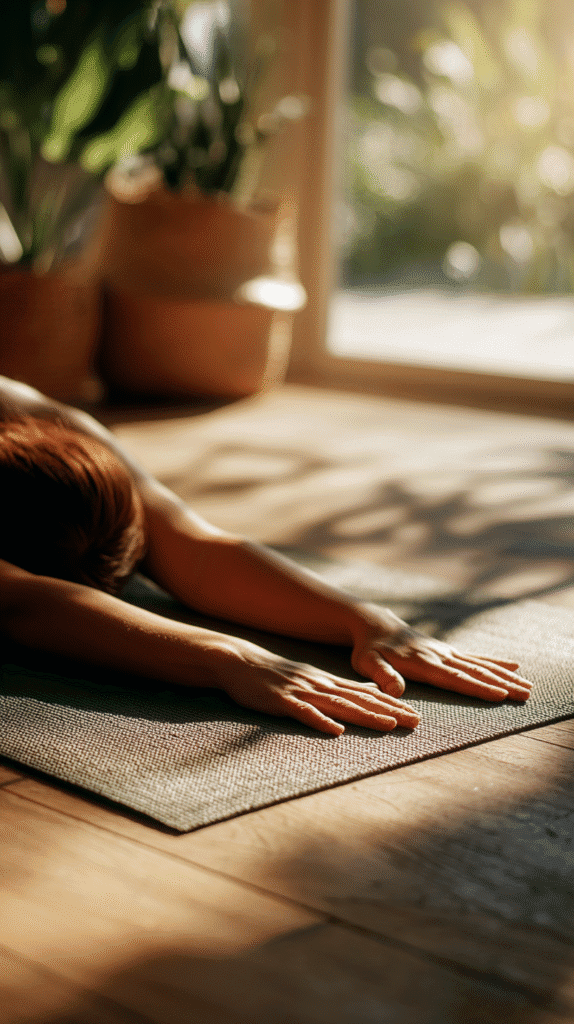This post may contain affiliate links, including those from Amazon Associates. If you make a purchase through these links, I may earn a commission at no additional cost to you. Learn more about our affiliate policy.
I remember a time when Sunday nights felt almost impossible. No matter how tired I was, I’d toss and turn restlessly, unable to quiet my mind or relax my body.
The anticipation of the week ahead would swirl through my thoughts. Tasks to complete, places to be, challenges to meet. I’d find myself staring at the ceiling, wishing sleep would finally come.
Over time, I learned that good sleep doesn’t start the moment your head hits the pillow. In fact, restful sleep begins hours earlier, with habits that signal your nervous system it’s safe to unwind.
By transforming Sunday evenings from stressful into restorative, I found my entire week benefited.
If you find yourself feeling tense, anxious, or restless every Sunday night, I hear you. This phenomenon, often dubbed the “Sunday scaries,” happens when our nervous systems anticipate the demands of the coming days.

But there’s good news: you can recalibrate your Sunday evenings to improve not just one night of rest, but your entire week of sleep and well-being.
Here are seven habits that I rely on every Sunday night to set myself up for restful, restorative sleep all week long.
1. Begin a Digital Sunset

Our brains and bodies are naturally attuned to the rhythms of nature, rising with the sun and winding down as darkness falls.
Modern life disrupts these natural cycles, especially through blue light emitted from screens. Implementing a digital sunset is a powerful way to cue your body for rest, reducing overstimulation and signaling that it’s time to wind down.
Here’s how to create a digital sunset at home:
- Turn off screens (phones, laptops, tablets) at least 60–90 minutes before bed.
- Dim overhead lighting and switch to warm, soft lamps or candles.
- Engage in restful, offline activities like reading, journaling, or enjoying calm music.
This intentional break from screens helps reset your nervous system, allowing your mind to relax and melatonin to rise naturally, signaling it’s time for sleep.
Take it further with a 7 Day Digital Detox to start healing your nervous system from overstimulation.
2. Use an Essential Oil Diffuser for Relaxation

Our sense of smell connects directly to the emotional centers of our brain, making it an effective tool for relaxation.
Essential oils have been shown to calm the nervous system, ease tension, and prepare the body for deep sleep.
These essential oils are particularly supportive of sleep:
- Lavender: known for its calming, anxiety-relieving properties.
- Vetiver: grounding, stabilizing, and helpful in quieting an overactive mind.
- Bergamot: uplifting yet soothing, reducing feelings of stress and anxiety.
- Frankincense: promotes a sense of calm and helps deepen breathing, supporting overall relaxation.
Use a diffuser in your bedroom or quiet space to create an aromatic ritual. Over time, your body learns to associate these scents with restfulness, enhancing their effectiveness.
For more diffuser recipes and blends to help you unwind, see my post on Essential Oil Diffuser Recipes for Fall Sleep & Relaxation.
3. Take an Epsom Salt Bath or Foot Soak

Warm baths and foot soaks are simple yet profound ways to soothe the nervous system. Adding Epsom salts enhances the calming effect, as the magnesium in the salts is absorbed through the skin, relaxing tense muscles and aiding the body’s preparation for sleep.
Try this restful bath ritual:
- Fill your bathtub or foot basin with comfortably warm water.
- Add 1–2 cups of Epsom salts, optionally blending in lavender essential oil or chamomile.
- Soak for 15–20 minutes in dim lighting or candlelight.
- After soaking, gently dry off and move directly to bed or your relaxation area.
For bath recipes tailored specifically to better sleep, you might enjoy these unique epsom salt bath recipes for deep relaxation.
4. Prepare Your Space for Rest

The environment in which you sleep profoundly influences your body’s ability to relax fully. Our bedrooms should signal safety, calmness, and quiet to our nervous systems.
Consider these simple steps to prepare your sleep environment:
- Tidy your bedside table, removing unnecessary clutter or distractions.
- Ensure bedding is comfortable, breathable, and seasonally appropriate (such as linen or cotton sheets).
- Adjust room temperature slightly cooler, around 65–67°F, ideal for deep sleep.
- Lower lighting to help your body transition into rest mode.
- Use a white noise machine or calming ambient sounds if external noises are intrusive.
By intentionally curating your bedroom space, you send subtle yet powerful cues to your nervous system that rest is safe and readily accessible.
5. Sip a Sleep-Supportive Herbal Tea

Warm beverages are naturally comforting, but certain herbal teas can specifically support relaxation and restfulness.
Herbs like chamomile, lemon balm, passionflower, and tulsi have calming properties that soothe anxiety, encourage relaxation, and gently prepare the body for sleep.
Create your own bedtime tea ritual:
- Brew a cup of herbal tea about 30–60 minutes before bedtime.
- Use a special mug that you associate exclusively with sleep or relaxation.
- Drink slowly and mindfully, noticing warmth, flavor, and aroma as sensory cues for your nervous system to unwind.
Regularly incorporating this tea ritual into your Sunday evenings strengthens your body’s association between these herbal cues and the onset of restful sleep.
6. Reflect with a 3-Minute Journal Practice
Often our inability to sleep stems from unresolved mental loops or anxieties about the coming week. Writing down your thoughts before bed can release these tensions and offer mental clarity.
Try this simple journaling practice every Sunday night:
- What felt nourishing or supportive today?
- What am I ready to let go of tonight?
- What is one thing I trust will unfold positively this week?
Taking a few moments to release your thoughts onto paper helps clear mental clutter, promoting deeper rest and emotional ease.
7. Do One Restorative Movement Ritual

Light, restorative movement in the evening can further help your body transition from alertness to restful relaxation. It signals safety to the nervous system and helps release lingering physical tension.
Restorative movements suitable for evenings include:
- Gentle yoga poses, such as legs-up-the-wall, child’s pose, or seated forward folds.
- Breath-focused stretching, synchronized with slow inhales and exhales.
- A brief, calming Qi Gong flow, designed specifically to quiet the nervous system.
Pairing this movement ritual after your bath or journaling practice can create a powerful relaxation sequence, enhancing your body’s readiness for restful sleep.
How to Keep Your Sunday Routine Sustainable
While implementing all these habits at once might feel appealing, sustainability comes through gradual, manageable shifts. Here are tips for making your Sunday night routine realistic and nourishing:
- Start with just one or two practices initially; let them become comfortable routines before adding more.
- Create a Sunday Sleep Basket with essential oils, herbal tea, your journal, and cozy accessories, keeping everything accessible simplifies the process.
- Be flexible and compassionate with yourself; your Sunday night practice doesn’t need perfection to be effective.
The Ripple Effect of Restful Sleep
Good sleep impacts your emotional resilience, mental clarity, mood stability, digestion, and overall quality of life.
By taking intentional steps each Sunday evening, you send steady cues of safety and calm to your nervous system, laying a strong foundation for restful nights throughout the entire week.
Your Sunday nights don’t have to feel overwhelming. They can become an anchor of restoration, setting the tone for restful sleep and greater well-being every day that follows.



